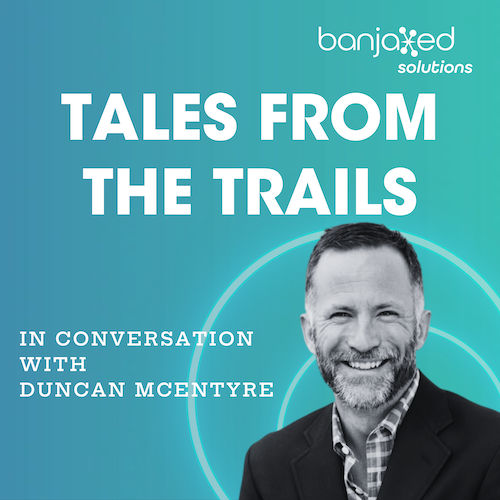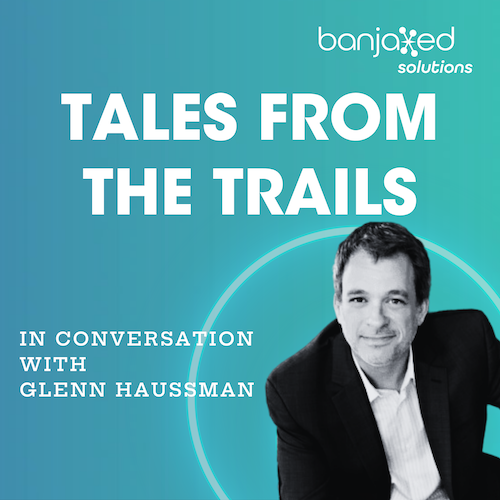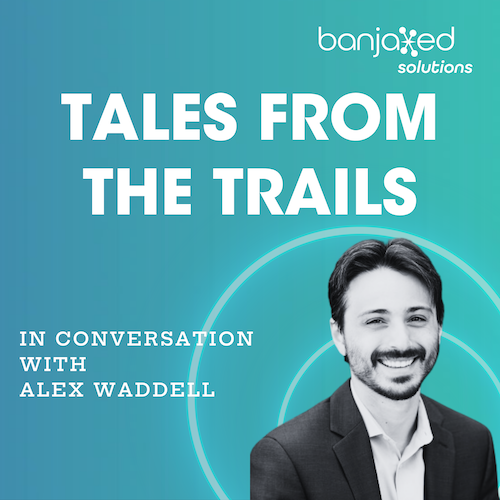
Guest: Phil Ogilby, CEO & Co-Founder, Stack Construction Technologies
In the Digital Age, every trade from industrial distribution to the stock market depends on data analytics to determine and reach their goals. Ever since the internet hit the mainstream, innovators have experimented with applying this technology to their work. Construction is no exception.
Join our new host and Salesforce Advocate, Kat Walther, on Tales from the Trails with Phil Ogilby, CEO and Co-Founder of Stack Construction Technologies. Having begun his career as a sheet metal worker fresh-out of high school in 1978, Phil has grown with the industry as technological advances became more widespread. He’s stayed ahead of the curve, developing innovative ideas to apply computer processing power and the internet’s expansive capabilities to construction technology.
Today, Phil takes us through the evolution of the family business, from roofing houses to developing cutting-edge software that is reshaping the construction landscape. See how getting on Salesforce, another innovative platform, took their budding construction technology company and helped them grow into a product powered by real-time customer insights.
Stack & Construction Technology Through the Years
Don’t have time for the full episode? Here’s what you need to know:
The Highlights
2:45 - Our mission statement very specifically is, we strive to add value and positive business impact to our customers and our partners through the Stack platform and to continue to drive efficiency and innovation in both pre-construction and construction.
3:01 - We started in pre construction. We've now expanded. We're truly building a platform that spans pre-construction and construction for our business partners. And so it really goes back to . . . [the] extraordinarily high failure rate in construction. Candidly, it's one of the riskiest businesses there are to start today, if you purely look at the failure rate. Primarily it's because people take a path much like I took, which was, you start in the building trades, you learn it. Maybe your dad was in it, maybe a family member, but you start in the building trades, you don't go to business school. You don't get a lot of formal business training and end up becoming an entrepreneur through one reason or another and you start your own construction business. And while you have skills in the trades, it does not at all translate into profitability. Our mission is truly to help people to succeed in an industry that I just passionately love and we try to give people an edge through our Stack platform.
4:13 - Let me give you the condensed version of my story . . . I remember sitting with my parents on the couch in our living room in Enon, Ohio. My mother says to me, “Phillip, we've saved $2,500 for your college fund. That's the bad news, but the good news is your dad can get you into the sheet metal workers union in Dayton, Ohio. You can start right after graduation and make $14 an hour.” In 1978, that was a small fortune. . . . so that's the path that I embarked on.
5:06 - But candidly, construction gets in your blood and that's all I knew to do.
5:12 - The economy turned down in the early ’80s and it really rocked my world. . . . At the time I had a mortgage and a son and maybe another one on the way, but I literally bought a book on how to roof your house . . . I read that book and then I went down and I put an ad in the Yellow Pages, which was the Google of its day.
5:54 - I started putting roofs on people's houses and hiring my out-of-work buddies. I cobbled together enough to buy an old truck and literally started with nothing.
6:00 - By the time I was 25, we had 50 employees. We're roofing big buildings all around Dayton, Ohio. It had become a success story. The commercial construction was very difficult, though. I'd love to tell you I made a pot of money in that business, but I really didn't.
6:13 - Along the way, my oldest son, Justin, was one of those computer genius kids. I came home one day and he had written a game on the computer . . . And I thought, “What if we buy you some more books and . . . software and let's create something we can use for the family roofing business.” It took longer than we thought. And it took more money than we thought but after about three and a half years, we developed a product that we came to call Buildware Pro.
6:41 - Buildware was a fabulous product. I remember showing it to one of my buddies in the roofing business and he's like “Holy cow, I can't believe you guys built this. How much to buy it?” . . . I went home and I thought about it. . . . And a couple of years later, I was out of the roofing business and I was full time in construction technology.
7:14 - Along the way, when the internet sort of came to be a thing, and I understood how it worked, I thought, “What if we build a solution that would allow a general contractor to electronically invite subs to bid?” Then we could distribute the drawings electronically in a PDF or a TIFF form . . . and then Buildware could be used to measure the drawings right on the screen without turning them into paper. That was 1999. We started iSqFt at that time and that was a hell of a ride. We started it during the Dot-com boom. It was primarily a business to distribute blueprints and bid opportunities to subcontractors—really what iSqFt still is today. It's now known as Construct Connect. We ended up selling that business for about $85 million.
7:58 - In 2010, we were still going strong at iSqFt and I thought “I've got to move on. I've got to do something different.” . . . That's when I left and started Stack. My wife, Jane and my son, Justin, came with us and we started Stack in 2012. We created a product called Cloud Takeoff which was the first ever measuring solution online.
8:21 - I wasn't sure people would really commit to a business-critical application via the internet in those days. But sure enough, within a couple of years, we had about 600 customers. I raised a little bit of money from family and friends at the time. And we relaunched it as Stack in 2015. We started out with takeoff software, we expanded into estimating software and now we've done a couple of acquisitions and grown the business and now we have a complete platform really from pre-construction, takeoff, estimating. All the way into using the tablet in the field on our smart use application and then construction management as well.
8:58 - It's been quite a journey but that's how we got to where we are today. And we're having a tremendous amount of success with Stack. It's really changing people's lives and helping them find success. And that's the mission we're on.
9:42 - At the time when we made the decision to onboard Salesforce, we were using another platform that was more designed around sales. . . . It had a lot of tools integrated just for sales that were very helpful but we chose Salesforce because it was the platform of record. It's become like Xerox. It's what CRM software is. We started with Salesforce and it gave us early results that were pretty good,
10:07 - I'll credit where credit is due: I hired a COO by the name of Ray Dizenzo about three years ago, and Ray's been a game changer for our business. And Ray brought his background with Salesforce with him. And then we've onboarded a couple of Salesforce experts within our company . . . and it's really been transformative. Salesforce has really allowed us to, in real time, have access to all of our churn data.
10:40 - You want to know where you're winning business and where you're losing business. I can tell you based on our Salesforce data. It's truly amazing the machine we've built with Salesforce up-to-the-minute. We're not scrambling to have our financials done at the end of the quarter because all of our important metrics are already real-time available to us every day inside of Salesforce. It's been a game changer for us. I just signed off on our most recent payment for Salesforce was $165,000. And looking back on that, it feels like a lot of money. It's one of the biggest checks I write even today with the size of our business. But it's an easy check to write because it's been an absolute game changer for us.
11:32 - Yeah, . . . some others in our organization would be better to answer that question. But we integrated for marketing. We integrated for sales, for sure. We integrated for customer success. We can tell inside of Salesforce when one of our customers is using a new feature, for example. Let's say we spend six months designing a new feature. We believe our customers are going to use it. When we finally roll it out, we've spent $300,000 creating this feature. We want to know people are using it. We feed the real activity data from the application back into Salesforce. So when customer success is talking to Susie at ABC landscape, We know whether they're using that new feature or not. Or if another company is thinking of leaving and they’re expressing frustration over this or that, we can tell if they're using that application within our software and if not, we can direct them to use it and hopefully save the customer from leaving.
12:21 - That level of detail is transformative inside of our business. All the customer usage data is available real time in Salesforce for our customer success team which has just been a game changer for us.
12:44 - We're really investing heavily right now in moving up-market. We’re the only solution in the marketplace that has a full API. API allows our users to reach inside of the software and pull their data. And push their data into Salesforce or any other application that they might use to manage their business. And so we're really investing heavily in our upmarket efforts, and that means expanding our APIs, making the APIs do more. . . . We're doing things around AI that's gonna be a game changer one day. We're already seeing early results there.
13:19 - We're expanding into the field. Much of what we've been doing the last 18 months is knitting these software solutions that we build around project management. We acquired rather around project management and field applications. We're merging those together with the Stack platform. We're going up market, selling to larger customers and we're moving into the field and bringing more value into the field for our users as well.
14:00 - Spend the money. That's my advice. Spend the money. But I need to put a caveat around that. So Salesforce feels expensive when you're just starting as a company in the beginning. Get over that. Just move past that idea because it's not. If you're doing it right, it'll change your business. If you're doing it right, you'll run your business entirely on the Salesforce platform.
14:20 - That also means probably in the early days, if you don't have the money to hire a dedicated expert in house. . . . then spend the money with a consultant.
14:34 - There's a lot more that you can do with Salesforce than you're currently doing. I promise you there is. You just need to figure out what that is and start doing it. You need to have your hands on your metrics in order to manage your business and especially never more so than today in this crazy environment. You need to know where you're making money, where you're losing money and how you can do more of the first. And Salesforce will do that for you, but you got to spend the money.
Construction technology advances every day, and so does the entire economy, with thousands of industry innovators making strides informed by Salesforce insights. Are you ready to reach new heights with your business? Banjaxed has the blueprints for success.



